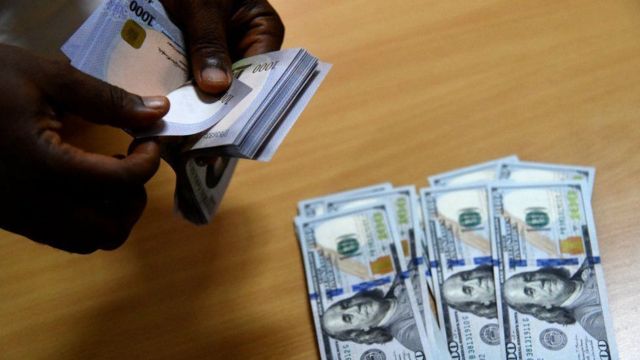Share!
A Nigerian scholar in the United Kingdom, Dr Dele Ogundana has called on the President Bola Tinubu’s administration to make policies that will enhance accessibility of foreign currencies to Nigerian residents abroad.
Ogundana made this known while reacting to the adverse effects of the unified exchange rate on Nigerians studying abroad as they find it difficult to pay their school fees.
Impacts of unified exchange rates
Tinubu, in his early days in office, made some economic reforms and one of them was the directive issued to unify the official and parallel market rates, which he said would save the country from financial hemorrhage.
This has made Nigerian students to be confronted with tuition fees increased by over 60 per cent.
This technically translated to the money they have in the bank accounts were not enough again to pay their school fees because of devalued naira.
Reacting, in an exclusive interview with Vanguard on Friday, Ogundana, a senior lecturer at the Nottingham Business School, UK, said the federal government should reconsider the exchange rate policy.
Government’s reconsideration of policy
He said Nigerian students are facing challenges of converting their naira to foreign currencies around the world. “The exchange rate policy in Nigeria requires careful reconsideration, especially regarding students who need to pay their school fees,” Ogundana said.
“Numerous international students face challenges converting their naira to pounds or dollars. They often resort to black market transactions or costly hand-to-hand exchanges.
“It is crucial for the Nigerian government to enhance accessibility to foreign currencies, particularly for students studying abroad. Additionally, they must address the declining value of the naira.”
Short-term remedies
While speaking about the challenges of Form A that is taking longer time to get than before, Ogundana, who also lectures at the Nottingham Trent University, UK, said families in Nigeria are sending money to their people in diaspora, while some have resorted to financial intermediaries.
He said, “Nigerian students studying in the UK now have access to an increasing number of financial intermediaries and payment platforms that facilitate convenient money transfers to and from Nigeria.
“These platforms are becoming more popular among students. Additionally, Nigerian students can establish connections with fellow Nigerians abroad who may be interested in remitting money back to Nigeria.”
While responding to whether the policy was a decoy for the federal government to discourage Japa syndrome.
The don said, “Indeed, that’s one way to look at it. However, there are other factors that need to be considered as well. It’s important to address the declining value of the naira, tackle inflation, and find solutions for importation-related issues.
“These additional explanatory variables play a significant role in the overall economic situation and need to be taken into account.”
UK’s limited work hours for students
While reacting to the challenges, a Nigerian student in the UK who spoke on the condition of anonymity said Nigerians have opted for doing menial jobs to raise money.
The source, however, said that students are limited to 20 hours work in a week, saying that anything above that could be detrimental to their stay and further visa application and renewal in the future.
According to the source, those who have spouses are financially better as they can rely on them to work fully.
“People do shifts. Because of the limited work hours, options are limited. Students can only work for 20 hours a week. So some get paid internships, warehouse jobs, jobs in healthcare, housekeeping jobs at hotels and guest houses, retail jobs at supermarkets etc,” the source said.
“The pay range is £10-12 per hour – so in a week, a student can make about £200-£250. Those who have dependents (husband or wife) fare better as the dependant can work full time.
“This varies but no matter the time spent studying, a student cannot work for more than 20 hours per week in most cases.”
Related posts:
- Singer R. Kelly Denied Request For Release From Chicago Prison Over Coronavirus Fears
- South Africa’s Communications Minister Gets Punished By President Ramaphosa For Violating COVID-19 Lock-down Orders
- Swaziland Prime Minister, Dlamini Dies After Testing Positive For COVID-19
- South Korea fines Google $32m for blocking sales on rival’s platform
